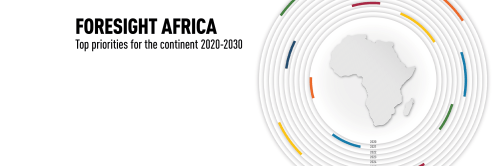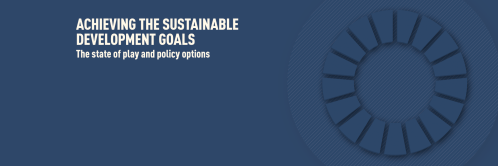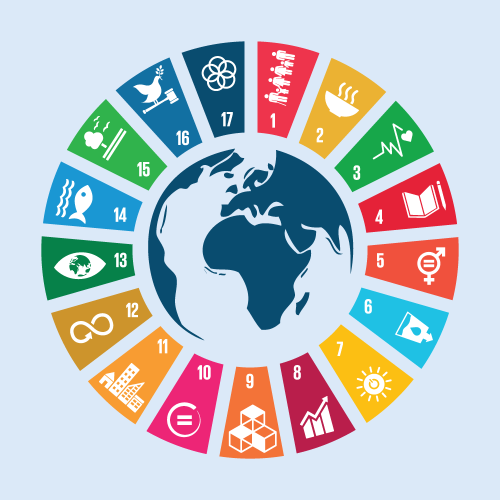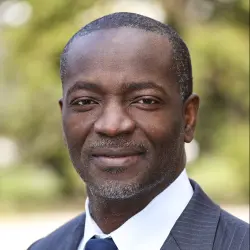Below is a Viewpoint from Chapter 1 of the Foresight Africa 2020 report, which explores six overarching themes that provide opportunities for Africa to overcome its obstacles and spur inclusive growth. Read the full chapter on achieving the Sustainable Development Goals.
Undoubtedly, one of the key challenges to achieving the Sustainable Development Goals (SDGs) over the next decade will be the ability to mobilize resources to finance them. Indeed, estimates by the Brookings Institution suggest that sub-Saharan Africa will need $574 billion per year until 2030 to finance the SDGs. While projected spending in a few countries, such as Botswana or Mauritius, will meet their SDG financing needs, for the vast majority of countries in the region, there is a substantial financing gap totaling $256 billion per year.
Meanwhile, the future of official development assistance (ODA), which has been an important source of financing for several countries, is increasingly uncertain as discontent with globalization and changing political environments are causing governments in many advanced economies to revisit their commitments. Net ODA is not keeping up with the growing financing needs of the region; in fact, as a percent of GDP, it has been declining steadily. Worryingly, given current trends, ODA will likely become insignificant by 2030 (Figure 1.4).
Against this backdrop, it is even more imperative that policymakers step up efforts to mobilize domestic resources. The beginning of a new decade offers opportunities for renewed commitments and redoubling of efforts on this front.
Tax revenues are the most important component of domestic resources, and raising them has been at the center of many domestic reforms and regional and international initiatives, including the 2002 Monterrey Consensus, the 2011 Busan Agreement, the Addis Tax Initiative launched in 2015, and the Platform for Collaboration on Tax launched in 2016. Indeed, these efforts helped boost non-resource tax revenues from 11 percent of GDP in the early 2000s to 15 percent more recently. Even so, Africa’s tax ratios are still among lowest in the world, largely due to both low taxation capacities—about 20 percent of GDP on average (compared with 30 percent in OECD countries)—and to inefficiencies in revenue collection.
The good news is that there is scope to raise tax revenues above current levels over the next decade by further strengthening tax capacity, such as through reducing informality or broadening the tax base, and by improving governance in revenue collection. A study by the Africa Growth Initiative at the Brookings Institution shows that tax capacity has already been improving, and, in fact, grew by 2.5 percentage points between 2000 and 2015. This pace is admittedly too slow. Even so, assuming the same pace is sustained through 2030, it will generate an additional $44 billion a year in revenues.
More importantly, improving governance around tax revenue collection can help close the gap between current taxes and tax capacity on the continent, and raise tax revenues by $93 billion a year through 2030. If, in addition, governments—with the cooperation of external partners—stem illicit capital flows successfully, the continent can raise up to 5 percent of GDP per year. This is equal to an average of $86 billion annually over the next decade (report forthcoming). In fact, developing countries lose 1.3 percent of GDP in tax revenues to companies shifting profits to low-tax locations, meaning that the region will lose an average of $23 billion per year over the next 10 years. International cooperation on taxation of multinational companies can help combat this practice and contribute to the mobilization of domestic resources.
All told, additional efforts to boost tax revenue collection and stem illicit capital flows would mobilize an additional $246 billion and narrow the region’s SDG financing gap substantially, to over $10 billion per year (Figure 1.5).
Despite the continent’s vast endowment of natural resources, inefficient management of those resources has prevented Africa from capitalizing on them, and addressing issues of weak governance in the sector will raise additional domestic resources. According to the Natural Resource Governance Institute, except for Ghana and Botswana, all African countries have “weak” or “poor” governance ratings, and seven of the world’s bottom 10 performers with “failing” governance scores are in Africa. Encouragingly, some countries, like Guinea and Liberia, are taking important steps to enhance transparency in the natural resource sector. In addition, governments should resort to more innovative financing mechanisms, such as blended finance or public-private partnerships and other risk mitigation mechanisms, to crowd in more private sector funds and help preserve the solvency of public sector balance sheets.
The run-up in debt that the region has experienced in past years and the current debate about another looming systemic debt crisis in the region reflect the fact that the issue of sustainable financing for Africa’s development remains unaddressed.
The run-up in debt that the region has experienced in past years and the current debate about another looming systemic debt crisis in the region reflect the fact that the issue of sustainable financing for Africa’s development remains unaddressed. The policy priorities to mobilize domestic resources outlined above will reduce the need for external financing and help avoid another systemic debt crisis. Policymakers should also enhance equity in tax systems and increase the efficiency of public spending; citizens are more likely to comply with tax collection when they trust that tax revenues are managed well. As African policymakers and external partners move forward on the domestic revenue mobilization agenda, it will be important to ensure that tax systems are more equitable and supportive of the SDGs.









Commentary
Approaches for better resource mobilization to finance Africa’s Sustainable Development Goals
January 17, 2020